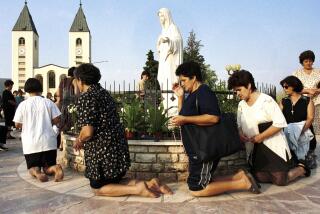Vatican Statement on Birth Is a Start, Not an Answer
- Share via
The Roman Catholic Church and procreation: perplexing questions, troubling answers.
The Vatican sweepingly condemned artificial insemination, in-vitro fertilization and surrogate motherhood in its statement, “Instruction on Respect for Human Life in Its Origin and on the Dignity of Procreation,” issued last week. The church reaffirmed that religious, spiritual and humanistic values must guide medical technology and that the dignity of the individual must not be violated.
These teachings seem particularly appropriate when juxtaposed against the disturbing Baby M case. Arguing whether a “contract” for surrogate motherhood is enforceable demonstrates how reducing ethical issues to questions of law and using legal terminology to discuss ethical dilemmas may indeed lead us to regard babies as mere objects or commercial transactions.
The Vatican reminds us that the new reproductive technologies deal with basic and mysterious philosophical questions: What is life? What is a person? What are the proper roles of parents? The church implies that in our fascination with medical technology we’ve forgotten that we must address these questions before we can use the new technologies with wisdom or humanity. Using medical technology simply because it is effective and available is morally irresponsible. The church’s ringing condemnation of using prenatal diagnosis for sexual selection will find widespread support, not just among Catholics. Similarly, those who are disquieted by the problem of “spare embryos” from in-vitro fertilization procedures will welcome the Vatican’s affirmation of the sacredness of human life.
But, while the document raises vital questions, both its answers and its approach are troubling. Many of the Vatican’s assertions contradict moral intuition and experience. The church’s prohibition of artificial insemination with the husband’s sperm because every baby has the right to be born through what it quaintly terms the “conjugal act” will strike many people as downright silly. A child conceived through artificial insemination using the husband’s sperm may be as desired and loved as a child conceived through sexual intercourse. In most cases the marriage and family are probably strengthened, not undermined, by this use of technology.
Other stands are scientifically naive. In prohibiting non-therapeutic research in embryos, the church overlooks the fact that therapeutic advances usually build on basic research that has no direct clinical benefit. In banning such non-therapeutic research, is the church willing to close off the possibility of cures for genetic diseases?
More generally, the church’s approach to these ethical issues will be unacceptable to many. Rather than offering justifications and arguments, the church appeals to authority and traditional teaching, and to assertions that sometimes border on the incomprehensible. A statement such as “Fertilization achieved outside the bodies of the couple remains by the very fact deprived of the meanings and values which are expressed in the language of the body and in the union of human persons” is unlikely to enlighten. Such obscure assertions may serve only to evoke contradictory assertions and further confusion.
More dispassionate analyses and discussion are needed. The Vatican statement, however, does not recognize that many of its assumptions can be and have been debated. For instance, many thinkers disagree with the Vatican’s assertions that from the moment of conception an embryo must be respected as a person. While an embryo must be considered a potential human being, legions of philosophers have disputed whether a potential person is to be treated identically to an actual person, such as an adult.
Though the Vatican’s directive raises pressing moral issues, its extreme positions may shut off reflection and discussion. A devout and thoughtful Catholic friend of mine, who finds great solace in his religion, shook his head sadly and said, “They make it harder and harder to be a Catholic.” Several prominent U.S. Catholic theologians have predicted that the new Vatican statements will be ignored by many believers, as Catholic doctrine on birth control is.
It would be unfortunate if the church statement polarized debate or was dismissed as irrelevant. The church has performed a great service by insisting that society confront these perplexing issues. Political leaders, the courts and the legislatures cannot avoid making decisions about the new reproductive technologies, as the Baby M case illustrates.
Forming public policy will be particularly difficult in a pluralistic nation in which most citizens do not share the assumptions and beliefs of any one church. But America needs to address these issues. Asking the hard questions is an important first step in finding the answers.
More to Read
Sign up for Essential California
The most important California stories and recommendations in your inbox every morning.
You may occasionally receive promotional content from the Los Angeles Times.













